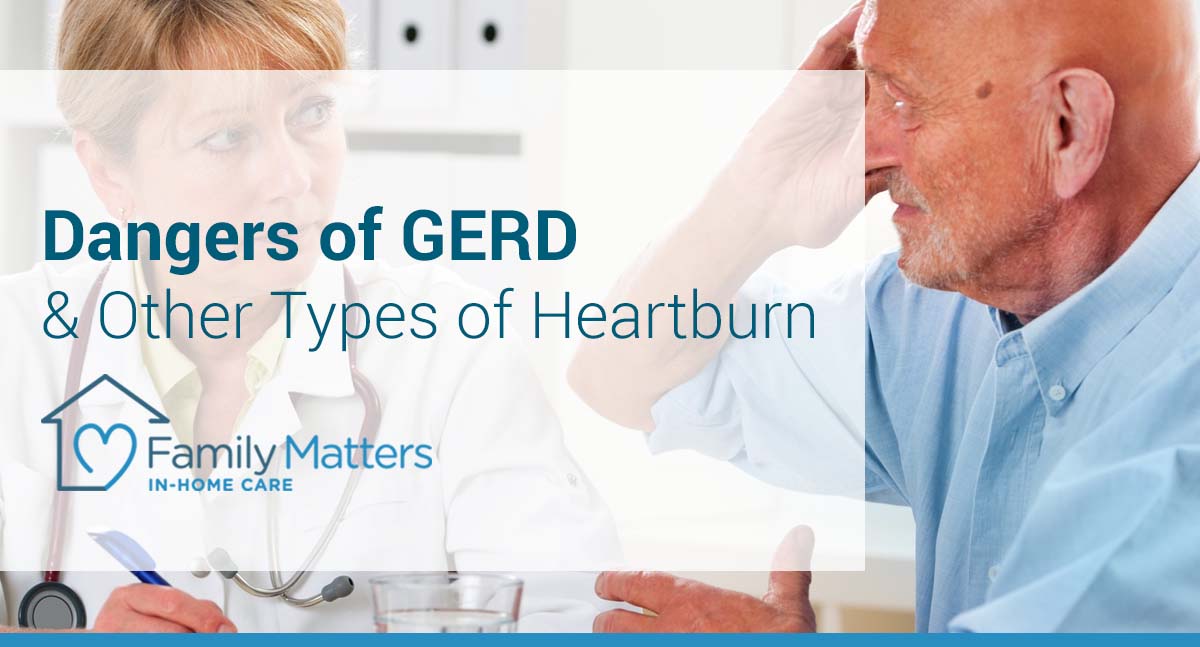
Dangers of GERD and Other Types of Heartburn
In the majority of cases, heartburn is caused by eating foods that are too spicy or high in fat content. However, certain types of heartburn can cause an erosion of the esophagus that can lead to a precancerous condition known as Barrett’s Esophagus. That’s why it’s important to know the frequency and causes of heartburn that your loved one may be experiencing in order to avoid this potentially dangerous condition. If your senior loved one takes heartburn medications more than twice a week, it is best to consult with his or her primary care physician.
Heartburn is actually a symptom of acid reflux and occurs when the muscle at the lower end of the esophagus relaxes, allowing stomach acid to flow back up into the esophagus. The major symptoms of heartburn are a burning sensation in the chest and the regurgitation of food or sour liquid into the mouth.
GERD, or gastroesophageal reflux disease, occurs when acid constantly washes back into the esophagus, irritating the lining and causing it to become inflamed. Over time, the inflammation can deteriorate the lining, causing bleeding, narrowing of the esophagus or a precancerous condition called Barrett’s esophagus.
Symptoms of GERD include
- Heartburn
- Chest pain
- Difficulty swallowing
- Dry cough
- Hoarseness or sore throat
- Sensation of a lump in throat
Lifestyle habits can contribute to heartburn
Smoking, obesity, diabetes and asthma can increase the risk of GERD.
The manner in which foods are eaten can cause heartburn.
- Eating large volumes of food at one time
- Eating on the run
The types of foods that are eaten can cause heartburn.
- High fat foods
- Acidic foods like tomatoes and citrus fruits
- Chocolate
- Spicy foods
Some drinks cause heartburn, especially those that contain caffeine, carbonation and alcohol.
- Caffeine can increase stomach acid
- Carbonation can bloat the stomach, increasing the risk of heartburn
- Alcoholic beverages can cause the muscle in the lower esophagus to relax, allowing gastric acid to move into the esophagus
Dietary changes can reduce heartburn
The good news is that many types of heartburn can be successfully controlled by diet and over the counter medication. Lifestyle changes can reduce heartburn.
- Eat smaller portions
- Eat more slowly
- Avoid fast food
- Prepare fresh food that is baked or broiled, not fried
- Limit acidic foods. If your loved one enjoys tomatoes try combining them with non-acidic foods like pasta or bread
- Drink water, milk and caffeine free herbal teas
- Avoid spicy foods
- Eat less chocolate. Don’t eat it after a heavy meal or on an empty stomach
- Chewing gum can help to produce saliva that neutralizes acid and signals the stomach to move its contents to the small intestine (avoid peppermint or mint gum that may contribute to more heartburn)
- Allow three hours between the last meal and bedtime
- Elevate the head when sleeping by about eight inches
In addition to dietary and lifestyle changes, medications* and even surgery may help to address GERD.
- Over-the-counter treatments include:
- Antacids like Maalox and Tums
- Medications that reduce acid production like Tagamet and Zantac
- Medications that block acid production and heal the esophagus like Prilosec and Prevacid
- Prescription strength medications perform the same role as the over the counter medications but at stronger levels.
- If Baclofen is suggested, discuss it with your loved one’s physician; side effects can include fatigue and confusion.
Surgery may be recommended if dietary changes and medication don’t help. Surgical procedures are usually minimally invasive requiring only three or four tiny incisions in the abdomen.
Addressing heartburn can increase the comfort and general health of your loved one. If you can’t be with them during the day we can. We will monitor their food intake, document food that creates discomfort and prepare fresh healthy meals for them that avoid heartburn and discomfort.
If you think an in-home caregiver might benefit your family, contact Family Matters In-Home Care for a free consultation. Our caregivers are thoughtfully selected to ensure that their skills and personalities will be the best possible fit for your loved one. We have seen many of our caregivers develop meaningful relationships with clients, and we strongly believe that these friendships have a positive effect on their overall health and well-being.
